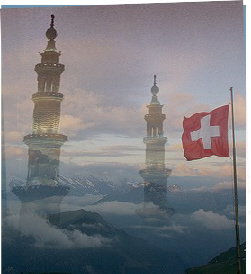The minarets won't come to the mountains
The vote by the Swiss people to support a ban on minarets has produced a storm of protest from politicians and pundits alike. But the issue illustrates the growing sense of cultures-under-threat from political pluralist agendas.
by Watchman
Where cultures and religions collide
 To experience a flavour of the controversy echoing around the Swiss alps, come with me to the Mediterranean island of Cyprus. To experience a flavour of the controversy echoing around the Swiss alps, come with me to the Mediterranean island of Cyprus.
From both an historical and present-day perspective, this favourite holiday destination comprises a fascinating mix of cultures, civilisations, politics and religions.
In the southern (Greek) part of the island Orthodox churches are many and impressive. These contrast sharply with the mainly-ruined and disused mosques which remain. The impression being that the latter are allowed to stand (or more correctly slowly fall down) as dilapidated monuments to the expulsion of things Turkish and Muslim from the communities in which they sit.
And crossing the ‘Green Line’ which divides the capital city of Nicosia provides the visitor – within a short street-length – brings a rapid and stark reminder of the contrasting cultures, religions, languages and lifestyles inhabiting one small piece of geography. The Greek and Turkish border controls remain as the ‘Berlin Wall’ of that little Mediterranean isle. And if the visit to the northern half of Nicosia is made at mid-day on a Friday, the sun seems to lose its warmth and a chill sets in.
A mid-day broadcast
At noon on that particular day each week the unwary visitor is greeted by the harsh and strident ‘muezzin’ call to prayer emanating from the minaret on a large mosque sitting just inside the Turkish sector. These public calls to Friday prayer – usually emitted through loudspeakers mounted high on mosque minarets – don’t sit comfortably within other indigenous languages, cultures and traditions.
As an audible signal, the Muslim call to prayer in no way resembles the melodic peel of church bells which invites Christians to worship on Sundays. Neither, it seems, is it perceived to chime (no pun intended) with the gentle tinkle of cowbells in the summer pastures of alpine slopes. For it seems from the recent Swiss vote to ban minarets that the Muslim cry is not regarded as welcome in the land of chalets, yodelling and mountain railways.
The spiritual import
And supremely of course there is a spiritual dimension. The call extols Allah and his prophet Muhammad as the supreme and ultimate prophet. Of course this element of the whole debate will be either totally lost on, or completely ignored by politicians, humanists, secular journalists, architects, town planners and all those riding the politically-correct bandwagon: that is to be expected.
But sadly however it also seems to have been lost on Christians within the dreamy spires of typically-English Oxford where local believers apologised to Muslims for having a time of prayer during Ramadan.
What also seems to be lacking in the midst of all the apparent support for equality, multi-culturalism, religious freedom and human rights is the fact that churches (and indeed any non-Islamic religious tokens) are banned in countries where Islam predominates.
Perhaps Baroness Thatcher had it right when showing a Saudi dignatory around the House of Commons. Her Arabian visitor asked the then Prime Minister when he might hear the Muslim call to prayer being sounded in the parliamentary corridors of power. She answered the question with a question: “And when will we hear church bells ring in Riyadh”.
In terms of gauging the process it is worth having a look at an analysis produced by one expert in the field. Dr. Peter Hammond outlines an interesting progression.
An expression of unease
Switzerland is proud of being an independent country – self-governing and answerable to none other. And it is perhaps this backdrop that has produced in its denizens a stubborn refusal to succumb to the pluralist agenda – an unwillingness to see their communities and culture come under the strident muezzin cries.
Politicians, journalists and other pundits have expressed their dismay at the outcome, and may indeed attempt to overturn the decision of the Swiss people. However, Switzerland is known as being a pacifist non-aligned nation, and to ensure it stays that way, the political elites will do well to the heed the concerns that are currently being expressed through the recent vote. |